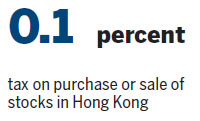Tax windfall for SAR as mainland funds pour in
Updated: 2015-05-14 09:20
By Bloomberg(HK Edition)
|
|||||||||
April was a good month for the Hong Kong taxman as a flood of mainland money into the city's stocks almost tripled stamp duties on trading.
The taxman collected HK$400 million a day in April from trading duties as daily turnover on Hong Kong Exchanges and Clearing Ltd's (HKEx) equity markets surged to a record HK$291.5 billion.
That may be just a start as the mainland looks to expand a trading link between Shanghai and Hong Kong this year to include Shenzhen.
Better-than-expected revenue from stamp duty, including on property sales, has already helped prompt the government to revise its budget and hand out tax rebates for the fiscal year ended in March.
The government tends "to give away cash or other kinds of subsidies in a relatively piecemeal manner," said Ma Ngok, an associate professor of political science at the Chinese University of Hong Kong. "If a European elected government was sitting on this kind of surplus, they would be very happy and would have a bunch of big projects."

The budget surplus last year was so big that the Inland Revenue Department had said it will be able to return as much as HK$20,000 to every taxpayer. Hong Kong shares get taxed every time they change hands, so sudden surges in volume lead to spikes in income for the city.
Hong Kong imposes a 0.1-percent tax on the purchase or sale of stocks. The levy generated 9 percent of the city's revenue in the 2013-14 tax year - the most recent for which detailed data are available - about 14 percent more than in the previous 12 months.
"The stamp duty collected and other government revenues will be pooled together to fund all public services and programs," said Fletch Chan, a spokesman for the financial secretary.
Stamp duty from property transactions and share trading made the biggest contribution to the surplus last year. Greater-than-expected revenue from taxes on corporate profits, incomes and land also helped.
"The stamp duty collected and other government revenues will be pooled together to fund all public services and programs," said Chan, a spokesman for the financial secretary.
(HK Edition 05/14/2015 page9)